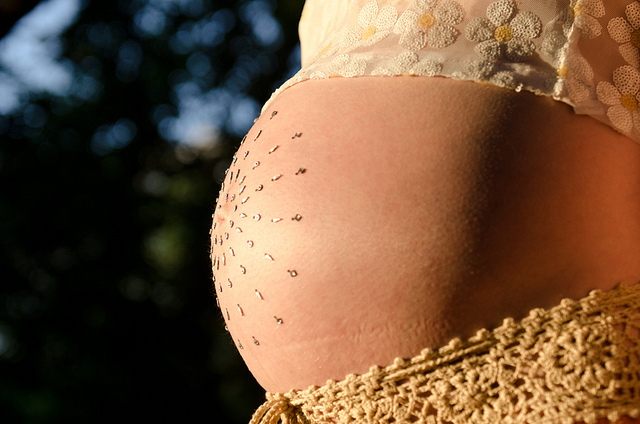
We’re grateful for modern birthing techniques, as they save lives during emergencies.
But the birthing experience has been hijacked by fear, preventing women from utilizing the wisdom of their own body during their pregnancy and birth.
If you’re reading this article, you probably already know that our 32% national average for Cesarean births is significantly higher than even the conservative World Health Organization recommends. This is known to be much higher than necessary to keep maternal and neonatal mortality rates low.
It’s easy to see how a combination of America’s technological advancement (that often unnecessarily raises alarm), our lawsuit-friendly attitudes towards doctors and our declining awareness of our bodies and health can lead to such an epidemic. At the same time there is momentum in the birthing movement right now. There is a resurgence of women reclaiming their interest in and now demanding choice in their birth. Midwives are again gaining popularity. Doulas have sprouted by the thousands. And the media is presenting home births to be the method-of-choice for many doctors and nurses. People are seeking practices like Acupuncture and Ayurveda for preventative care, labor support, and postnatal recovery.
Women are hungry for re-engaging their roots—a lineage of birth practices, passed down for millennia.
Ayurveda is precisely that—an ancient and comprehensive system of health encompassing the mind, body and soul. Its roots are in India. “Ayu” from “Ayus” means age or longevity and “Veda” means the living knowledge or wisdom of a Science. Ayurveda then is the wisdom of longevity, or the wisdom of what sustains life.
Traditionally, it offers a vast arena of expertise that ranges from internal medicine and surgery, to psychiatry, toxicology, paediatrics, gynaecology and obstetrics.
For me, finding Ayurveda as a young adult was a huge blessing. With an early childhood rendezvous with pesticides, followed by heavy treatment with antibiotics and steroids, combined with an emotionally unstable home environment, I battled a weakened immune system and chronic illness my entire adolescence. Asthma, cardiovascular problems, neurological dysfunction, chronic pain and digestive disturbance left me feeling hopeless. Today, I live pain-free and prescription-free, doing what I love.
My first-hand experience with the resilience of the human body is what inspired me to deeply study Ayurveda in the U.S. and in India and pass on this knowledge of how we can heal and thrive. In the process of healing myself, I regained a passion for life and an appreciation for the incredible life-giving potential of every woman. Now my work as a Birth Doula, and as an Ayurvedic Practitioner, greatly inform each other.
By offering a plethora of wisdom about the human body system and natural remedies for healthy reproduction, Ayurveda gives us valuable tools to fill in the gaps of both childbirth education and modern health practices. It integrates seamlessly into whichever birth plan one chooses.
Here are five radical ways this ancient health system can support your pregnancy and birth.
Purify and Prepare Your System for Conception.
Beyond pre-natal vitamins, preparation for pregnancy is often completely overlooked. However, before conceiving, it is important to prepare and purify the body (and mind) of both the mother and the father. This is similar to preparing the soil to plant a seed—the healthier the soil, the healthier the plant.
In Ayurveda, Panchakarma is recommended to couples looking to conceive. Translated to “five actions” this is a traditional Ayurvedic therapy for deep-tissue detoxification and full-body rejuvenation. It resembles an intensive personal healing retreat, where 5-21 days of relaxing and cleansing therapies are given to clear the body of toxins, balance digestion, boost the immune system and prepare both mind and body for conception. It can hugely impact fertility and long-term health, even in those that are dealing with infertility. Along with hands-on therapies, dietary, lifestyle and herbal regimes are given. This prepares a woman’s body for pregnancy and increases men’s potency and quality of sperm.
Adjust your Diet to Suit Each Month of Pregnancy.
Ayurveda outlines specific practices for each month of pregnancy that go beyond the common recommendations of avoiding alcohol, drugs, and raw meats/fish. There are specific foods to eat and avoid, herbal formulas for different stages of pregnancy and remedies for common pregnancy ailments like morning sickness, oedema, pain, heartburn and indigestion. There are also simple and fun home remedies to build and replenish vital nutrients lost during intercourse—especially for men.
Some tips: Avoid spicy, heavy and sour foods, chilled water, garlic, table salt, processed sugar, caffeine and excess black tea (the tannin found in tea and coffee may inhibit iron absorption). According to Ayurveda, all of these can be damaging to the foetus. I recommend eating fresh foods and avoid dried, processed and frozen foods.
Reproductive tonics include dates, figs, cardamom, pistachio, seeds, pomegranate and asparagus. Try making a date smoothie with fresh dates, hemp milk, almond butter, cacao and cardamom as a post-intercourse tonic!
Herbs: Many herbs and supplements are not recommended during pregnancy. A few that are thought to be safe and effective include: ginger, red raspberry leaf, shatavari, peppermint, and fennel. Please use under the care of an herbalist or holistic doctor.
Ramp Up the Use of Oils.
After culturally villainizing fats for the last couple decades, it is finally been scientifically reinforced how important fats and oils are for virtually all functions of the human body. Ayurveda has always used herbal oils, internally and externally, as one of its main therapeutic techniques.
Externally, we use medicated oils on skin for massage and daily self-application to prevent stretch marks, keep the Vata dosha (the biological humor responsible for movement, circulation, and nervous system function) in balance, and build strength and elasticity of the body. This practice also helps to reduce aches and pains in the joints, and protect the skin from environmental toxins.
I also recommend oils vaginally, to lubricate and soften vaginal walls in preparation for labor. This can assist tremendously in the ease of delivery and help to prevent tearing of the perineum during delivery. You can use organic coconut or olive oil, which are both safe and mild, or an Ayurvedic practitioner can recommend traditional herbal oil for you.
Basti (enema therapy using herbal oils and decoctions) is used in both pre-conception and during the 8th and 9th months of labor. Basti, although sometimes not the most appealing, is considered the most powerful therapy in Ayurveda. And most come to love it, because of how good they feel afterwards. It is both cleansing and rejuvenating, and is used as the main therapy for conception and infertility. In the late stages of pregnancy, it is used to clear the bowels, lubricate the body, and encourage the proper downward flow (called Apana Vata) essential for delivery.
Postnatal Recovery.
Did you know that most women never recover from their first birth? In the US, there is little emphasis placed on postnatal care. It is time for this to change.
Ayurveda focuses on post-delivery care in order to nourish the mother and baby alike—with the goal of bringing the mother back to her pre-pregnancy state (or better) as soon as possible. In addition to complete rest for at least ten days after delivery, a postnatal diet that emphasizes easy-to-digest warm foods is imperative. I recommend digestive herbs, as well as therapies like Abhyanga (Ayurvedic warm herbal oil massage) and Swedena (herbal steam bath), which help balance digestion, encourage healthy lactation, sleep, detoxification and wound recovery.
I also encourage new parents to massage their newborn with warm fresh-pressed coconut oil or bala oil, a traditional Ayurvedic oil used for newborns. This aids in the healthy development of the little one and is also a great time for bonding—especially for dads who tend to get less skin-to-skin time.
Prepare Yourself Mentally and Spiritually.
This is perhaps the most important and most overlooked aspect of pregnancy care. Facing a cultural epidemic of postnatal depression and other chronic physical and mental health ailments during the childrearing years, adequate mental and spiritual preparation is necessary for creating stability during this pivotal transition in life.
Yoga, meditation, and pranayama (breathing practice) calm the mind and nervous system and train breathing practices that can be used in labor. Yogic relationship counseling promotes communication, encourages sacred bonding between partners and creates honest intention around child rearing.
Be sure to seek out guidance from a wise mentor that you trust, create a village of support, and insist on open communication between you and your partner. It’s worth doing some hard work now. Resolve and forgive your past, so you don’t bring it into your child’s life. The honesty and intention will pay off with a sturdier and more joyful foundation to build upon.
With all of the options out there, it can be challenging to decide on which road to take. The good news is, birth is a completely natural phenomenon and your body already knows how to do it. You just have to remember and give it the right tools to do the job. Ayurveda can provide nurturing support from preconception through to the postnatal period, no matter which birth model you decide.
If you want more information on how Ayurveda can support you, please don’t hesitate to reach out to me, or a local practitioner in your area.
Educate yourself. Educate the community. Demand options. Reclaim your health. Have the courage to be the change!
~
Author: Madison Madden
Editor: Sarah Kolkka
Image: Alena Getman/Flickr










Read 6 comments and reply